'We don't want the hype' : How homegrown operators aim to revive bike-sharing in Singapore
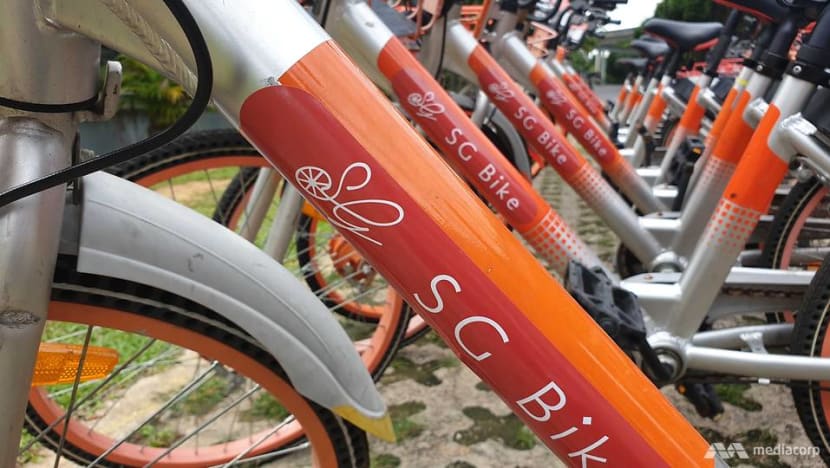
Local start-up SG Bike, which took over Mobike's bike-sharing licence in November 2019, is rebranding the Beijing-based company's orange bicycles with its own logos. (Photo: Zhaki Abdullah)
SINGAPORE: At its peak in early 2018, shared bicycles were ubiquitous, with the major bike-sharing firms here claiming millions of users each.
But following the imposition of regulations that capped the number of bikes each company could operate - as well as the dramatic exits of several companies - shared bicycle numbers plunged, and along with them the number of users.
Yet despite this, the three homegrown firms that now make up the sector are optimistic that bike-sharing has a bright future in Singapore.
Last month SG Bike announced it had completed its takeover of Mobike’s bike-sharing licence.
The Beijing-based firm had earlier announced plans to withdraw from the Singapore market.
SG Bike is now able to operate a fleet of 25,000 shared bicycles here, making it the largest player in Singapore’s bike-sharing market.
Two other companies, Anywheel and Moov Mobility, were both authorised by the Land Transport Authority (LTA) to operate 10,000 bicycles each earlier this year.
Between the three companies, the total number of shared bicycles allowed on the streets here stands at 45,000.
“For me right now, this is really quite surreal,” said SG Bike chief operating officer Sean Tay. “If you told me two years ago that we would be buying over Mobike, I wouldn’t believe you.”
Taking over Mobike’s operations drastically increased SG Bike’s fleet, which stood at 3,000 bicycles under its previous licence.
This, he said, places SG Bike in a better position to achieve its goal of making shared-bikes what he termed the “fourth mode of public transport”, after buses, trains and taxis.
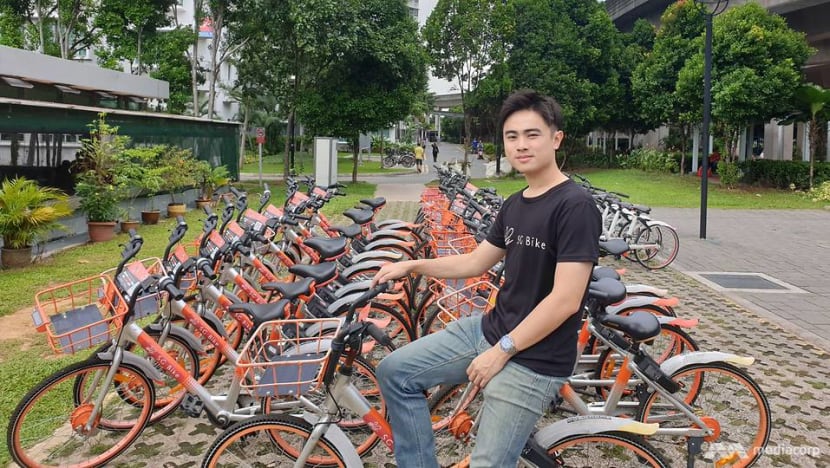
REGAINING USER CONFIDENCE
In early 2018, there were six companies - Anywheel, GBikes, Mobike, oBike, ofo, Share Bike SG and SG Bike - offering about 200,000 dockless shared bicycles in Singapore.
The wheels came off for oBike in June of that year, however, when the company unexpectedly announced it was shuttering its business here.
The company cited an inability to comply with the LTA’s then-new licensing regime, which would have required it to pay the authorities S$60 in fees per bike and implement measures to deter indiscriminate parking.
The move left about 70,000 of oBike’s bicycles scattered around the island, with more than 200,000 users owed S$8.9 million in unrefunded deposits.
Two other companies, Gbikes and Share Bike SG, also shut down their operations in 2018.
In April this year, ofo’s licence to operate a bike-sharing service in Singapore was cancelled by the LTA, as it was unable to meet the authority’s regulatory requirements.
This came after the Beijing-based company was reported to be experiencing “immense cash flow problems” late last year.
READ: Is dockless bike-sharing doomed to fail in Singapore?
READ: Commentary: Lessons from the fall of once-mighty bike-sharing giants
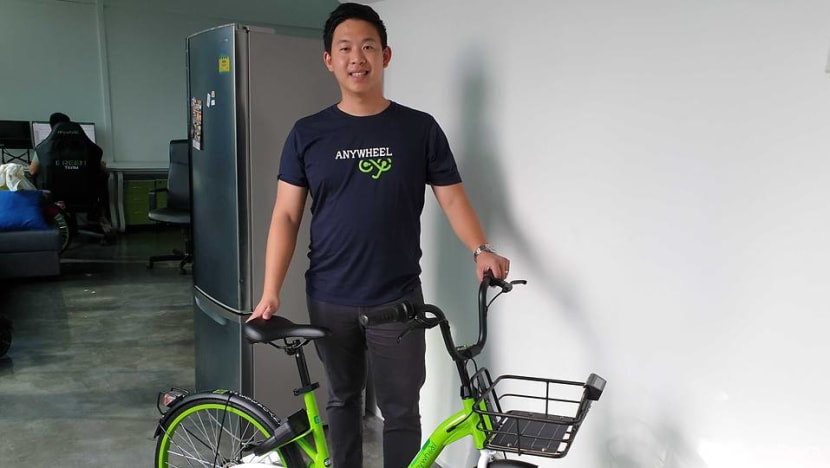
These developments caused users to lose confidence in bike-sharing, said Anywheel chief executive Htay Aung.
While other bike-sharing companies were able to rapidly expand a few years ago as they were flushed with cash, dumping thousands of bikes in each city they rolled into, the relatively smaller operations of the existing players meant they have had to take a more strategic approach.
SG Bike – whose majority shareholder is estate upgrading company ISOTeam - first launched in 2017 with a fleet of just 300 bicycles in the Holland-Bukit Panjang area.
Though its fleet size has grown, SG Bike is continuing with its town-by-town expansion approach, which it says is a more sustainable way of growing its business.
SG Bike will first begin deploying Mobike's bicycles in Punggol, before expanding to other parts of the north-east region and then the rest of Singapore.
The easy availability of bikes in a particular area is more likely to fuel demand rather than rapidly deploying them across the island, said SG Bike marketing director Benjamin Oh.
“When you’re a lot smaller, you’re forced to think in this manner. It made us think about how to be creative and consider the sustainability of the business,” said Mr Tay.
Anywheel runs on a similar strategy, said Mr Htay Aung, adding his firm does not overspend or deploy more bikes than it feels is sustainable.
“I never really saw them (SG Bike) as competitors because we are both local startups and both our companies have very similar business models,” he said.
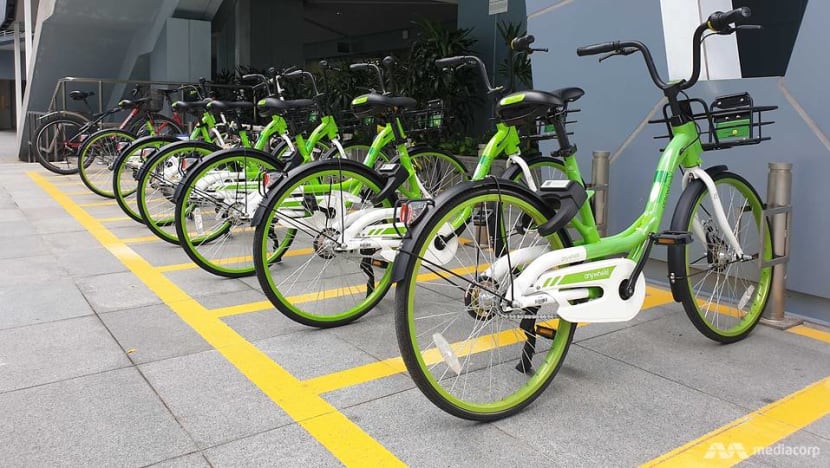
Companies must operate responsibly and prudently to regain customer trust, said Mr Htay.
Though personal mobility devices and e-bikes may fulfill some of commuters first-and-last mile transport needs, bicycles remain the most flexible option, said Mr Tay.
And while some of the hype over shared-bikes may have died down over the last two years, there is still an “inherent demand” for bicycles to meet these needs, said Mr Tay.
“We don’t want the hype. What we are trying to do is create a sustainable business,” said Mr Htay Aung.
Ridership of Anywheel’s bicycles is constantly increasing, he added, though he declined to provide figures.
“I wouldn’t say we are profitable yet, but from our data I believe we could be profitable, hopefully by the second or third quarter of next year,” he said.
He notes Anywheel is rapidly expanding in Malaysia, where it also offers shared e-scooters, and expects to launch in Thailand by the end of the year.
The company is also expanding into offering power-assisted bicycles – otherwise known as e-bikes – both in Singapore and regionally.
Though there may be regulatory hurdles to offering shared e-bikes, one other option would be to rent them out to delivery companies, he noted, adding it hopes for these e-bikes to be available by March or April next year.
Moov Mobility, the third shared-bike operator here, is planning to launch e-bike sharing operations in a number of cities in the Asia-Pacific region, and also hopes to bring such a service to Singapore.
The company developed bikes, e-bikes and e-motorbikes for sharing, to meet the needs of the regional market, said Moov's chief executive Sharon Meng.
Having made its debut here in the middle of this year, rolling out 1,000 refurbished ofo bicycles in the Western part of Singapore, Moov aims to have all 10,000 bikes available islandwide by the first quarter of next year.
Ms Meng – who was previously with Mobike as its Singapore country manager – told CNA it is looking at partnering with other organisations for sponsorship as part of its business sustainability strategy.
"Almost all high quality sharing systems around the world require some combination of advertising, sponsorship and government subsidies to cover the operating cost and ensure that private operators price the service within the reach of the key user groups," she said.
SG Bike declined to provide information on ridership or profitability, noting its parent company ISOTeam is publicly-listed.
On its part, the LTA has halved the licencing fees for bike-sharing operators, with a full two-year licence now priced at S$15 per bike - down from S$30 previously - while sandbox licences are priced at S$6 per bike, down from S$12.
"The lower fees will reduce compliance costs for operators," said an LTA spokesperson, adding such regulations and fees are regularly reviewed to ensure they "keep pace with market developments".
"This supports device-sharing operators in providing active mobility options for first- and last-mile journeys, and contributes to our vision of becoming a more car-lite society."
The S$30 refundable security deposit firms have to pay for each bicycle deployed - which is aimed at defraying the cost of removing bikes should a firm go bust - remains unchanged.
The Straits Times reported last Friday that in line with the reduced fees, the LTA had refunded more than S$570,000 in total to Mobike and the three existing operators.
READ: Wheel woes: The rise and fall of Singapore's bike-sharing industry
Commentary: With Mobike’s impending exit, is it time to give public bike-sharing a shot?
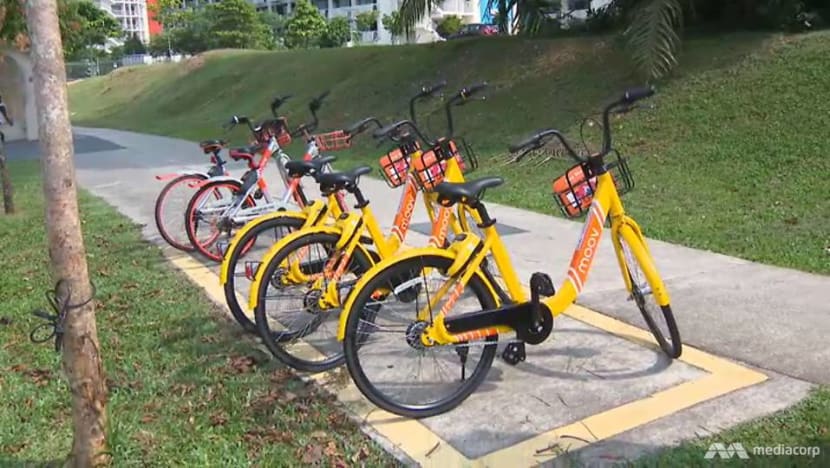
ROOM TO GROW
Observers shared the operators' optimism.
Mr Li Jianggan, chief executive officer of startup accelerator Momentum Works, said he still believes there is a future for companies in the bike-sharing space here.
"The market could easily become profitable for a small number of players running at enclosed places such as towns and parks," he added.
"Since oBike and others flooded the market, the sector never managed to develop in a sustainable and profitable manner. Now with the craze over, there is actually a chance."
With investors no longer willing to pour as much funding into bike-sharing, Mr Li suggested that companies should avoid unnecessary competition.
Cycling advocate Francis Chu, the co-founder of enthusiast group LoveCycling SG, also believes there is still room for bike-sharing services in Singapore, citing their usefulness for short commutes.
He said companies must ensure their bikes are well-maintained and have enough manpower on hand to relocate improperly parked bicycles, adding more bikes should be made available.
“Right now there are too few bikes to support a reasonable level of service,” said Mr Chu, who himself ran a short-lived bike-share scheme in the one-north area in 2012.
Despite losing his S$39 deposit to ofo, photographer Lim Yong Teck said he would still be interested in using shared bicycles.
"I’d be worried if I lose a lot of money, but in this case I think (bike-sharing) is great for commuters," said the 30-year-old.
"The bikes do make getting around to places a little bit more convenient, and quicker."
All three firms see room to grow in the Singapore market, and hope to expand their fleets further in the future.
“The three of us combined, with 45,000 bikes, that’s way below what the market demand is,” said Mr Htay Aung.












